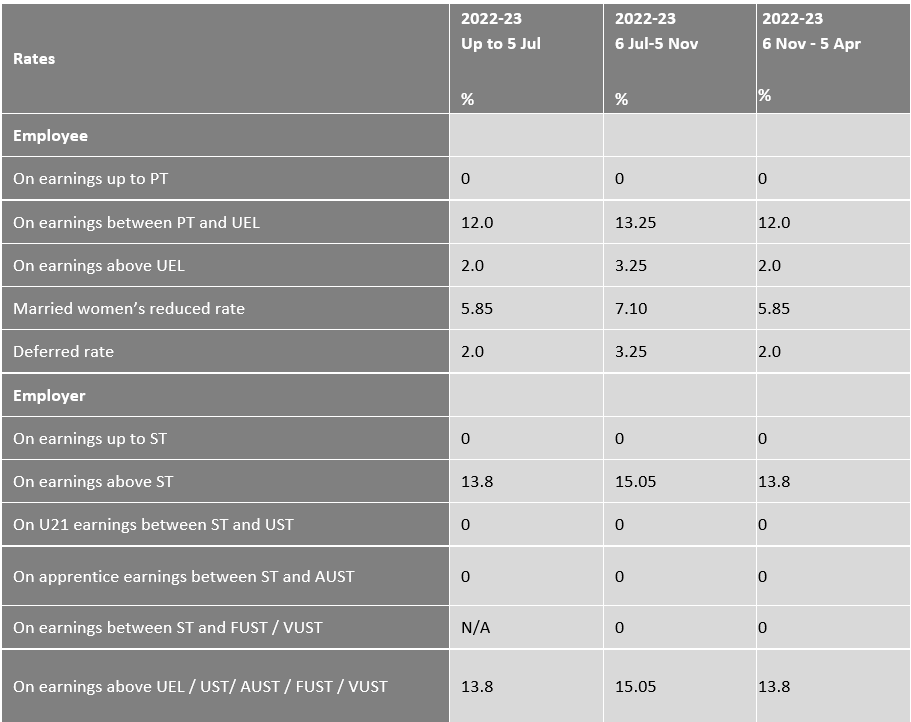Clockwork News. |
 A Chancellor must present a Budget accompanied by independent economic forecasts prepared by the Office for Budget Responsibility. In place of a Budget, Chancellor Kwasi Kwarteng delivered a fiscal statement on 23 September, which means OBR assessments of the economy will have to wait until later in the financial year. Despite not being a full-scale Budget, there was still a lot of significant changes announced that needed to be understood and implemented. National Insurance rates reduced from 6 November 2022 In March this year the previous Chancellor, Rishi Sunak, announced that National Insurance rates would increase by 1.25% from 6 July, a temporary measure ahead of the introduction of a Health and Social Care Levy in April 2023. Payroll departments and software developers had three months in which to prepare for the increased rates. National Insurance rates were reduced by 1.25% for the remainder of the tax year, though the reduction cannot be backdated. The current Chancellor reversed the increase for the remainder of the tax year on 23 September. Six weeks from now, this reduction will take effect on 6 November. Some employers may not be able to make these changes in time, so refunds may be required. HMRC had previously asked software developers and employers to include a temporary generic message on payslips for the tax year 2022-2023 to explain the reason for the increased NICs. This message will not be applicable from 6 November 2022 and employers should now remove it from payslips. The Health and Social Care Levy, which was scheduled to come in April 2023, has been scrapped. The Class 1 NIC rates for 2022-23 are now as follows: Changes to income tax rates from 6 April 2023 The National Insurance changes had been widely predicted for some time, but changes to income tax came as more of a surprise. Kwasi Kwarteng brought forward by 12 months a planned reduction in the basic rate of income tax from 20% to 19% from 6 April 2023. In addition, he also announced that from the same date the additional rate of income tax of 45% for those earning above £150,000 will be abolished. This means that all annual income above £50,270 will be taxed at 40%, the current higher rate of income tax. These tax cuts apply in England, Wales and Northern Ireland. Scotland sets its own rates so is not affected. Off-payroll working rules repealed The Chancellor didn’t only restrict himself to announcing monetary changes, he also announced changes which the government believes will remove, or at least ease, administrative burdens on businesses, therefore boosting economic growth. And one of these announcements will have a significant impact on many payroll and HR departments, as we now know that the changes to the off-payroll working rules, introduced in the public sector in 2017 and extended to medium and large-sized organisations in the private and voluntary sectors in 2021, will be reversed. This means in practice that from 6 April 2023, workers providing their services via an intermediary will, once again, be responsible for determining their own employment status and paying the correct amount of income tax and National Insurance contributions. Possible employment law changes on the horizon It was only one sentence in the Chancellor’s statement, and his mention of “sunsetting” EU regulations by December 2023 may have been overlooked by those focussing solely on the tax cuts. It doesn’t have the catchiest of titles but the Retained EU Law (Revocation and Reform) Bill which was published on 22 September has the potential to impact everybody in the UK. When we left the EU, legislation was passed which incorporated EU law into UK law. This Bill aims to overturn that, allowing the UK government to make its own legislation. And let’s be honest, that was one of the main drivers for people voting for Brexit. But there is concern in some quarters that the reduction of burdens on business to improve growth may lead to the removal or relaxation of some employment rights such as:
0 Comments
Leave a Reply. |
AuthorJack Chinnery - Head of Payroll Archives
February 2024
Categories |


 RSS Feed
RSS Feed
